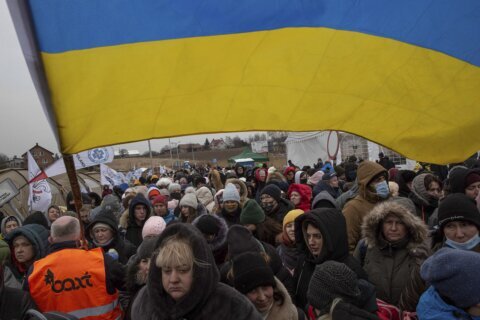Nearly one month after Ukrainian forces barged into the Kursk region of western Russia, the Kremlin’s forces have not mounted the fierce response many experts predicted.
According to a top defense official from the Netherlands, it might not ever happen.
Gen. Onno Eichelsheim, chief of defense of the Netherlands, praised Ukraine’s military tactics, but he indicated they have not produced a large-scale Russian military response.
“On the strategic side, you would like to have a reaction from the Russian Federation, perhaps letting go of part of the troops from the Donbas or making another move for the reserves,” Eichelsheim said.
Neither has happened.
Asked why Russian forces have not responded in larger numbers, he suggested the Kursk region is not Moscow’s top priority.
“Russia focuses specifically on the Donbas. They want to get that area conquered as soon as possible. And that’s actually what the focus is, and they are staying on that course,” Eichelsheim said.
A former Ukrainian military official told WTOP he believes the incursion, which has turned into what Kyiv now calls a temporary occupation, was designed to force Moscow to respond to Ukraine’s military moves.
“The goal is not to annex Russian territory but to create a diversion that impacts Russian military plans and generates internal instability within Russia,” said Andriy Zagorodnyuk, Ukraine’s former defense minister.
Ukraine’s military has not communicated its specific goals for the incursion. Without clear, official guidance from Kyiv about its objectives in Kursk, Eichelsheim said many assumed a large Russian military response would happen.
“It was something we thought they would like to do. And we don’t know that. So, what is behind it? We have to see. Time will tell us if this was the best move for Ukraine.”
The impact of Ukraine’s incursion
Ukrainian forces have established defensive positions in Kursk, including trenches, which indicates the potential for a prolonged presence and a significant escalation in the conflict.
Zagorodnyuk, an Atlantic Council distinguished fellow, said Ukraine has seized the momentum and put Russian President Vladimir Putin in a difficult position.
“We need to find a way to stop him so that he stops the war and withdraws from our territory. We need to find a way to make the conflict more visible for Russia and to convince, at least indirectly, Russian leadership that they cannot be successful,” Zagorodnyuk said.
He suggested that ordinary Russians need to see the ugly side of the war.
“One of the ways to do that was to start attacking Russia itself in order to divert their forces and show them that their capabilities are not as strong as they claim they are,” Zagorodnyuk said.
But more importantly, he said, “The idea is to create instability inside Russia so that they stop thinking about Ukraine and start to think about their own safety.”
The incursion, according to Zagorodnyuk, was designed to do more than put Moscow on the back foot. It was a deliberate attempt to embarrass the Kremlin.
“They would be in a very stupid situation if they conquer part of Ukraine, but at the same time lose part of Russia. And that’s what we see right now — an attempt to realize that plan,” he said.
For more than two-and-a-half years, Russia has waged a full-scale war against Ukraine that is considered an existential threat to Ukraine.
And while hundreds of thousands of Russian troops have been killed and deep flaws in the Kremlin’s military strategy have been exposed, Eichelsheim said the incursion could create a significant problem ahead for Ukraine.
“One downside could be the diversion of reserves to Kursk, which might impact their ability to sustain the front in Donbas. However, Ukraine’s ability to maintain its lines there is notable,” he said.
Western support and its impact
Another key concern for Ukraine is Western support, particularly from the U.S., which has been crucial in bolstering Ukraine’s military capabilities.
“Without U.S. assistance, Ukraine would not be in its current position. The scale and impact of Western aid, including advanced weaponry, have been crucial,” Zagorodnyuk said.
Yuriy Sak, adviser to Ukraine’s minister of strategic industries, said Ukraine’s troops are making the most of the weapons they’ve gotten, but they could impose significant military setbacks on Moscow’s forces if they had the go-ahead from Western allies.
“We are burning their oil refineries. We are hitting the airfields. Of course, we need the permission of our allies to use long-range missiles to strike Russia and destroy their military capacity. This would bring the victory closer under Ukrainian conditions,” Sak said.
Zagorodnyuk noted the advanced weaponry and resources provided by Western allies have significantly enhanced Ukraine’s defensive capabilities.
“The assistance from Western allies has been a game-changer,” he said.
But a puzzling incident on Aug. 26 has cast a shadow over how those resources are being used.
Ukraine lost one of the six F-16s it received from the West, and tragically, Oleksiy Mes — call sign “Moonfish” — widely regarded as Ukraine’s most skilled fighter pilot, was killed in an unexplained crash.
The Ukrainian Ministry of Defense said communications with his plane were lost and he crashed, and “it was not pilot error.”
Igniting outrage within the ranks of Ukraine’s military, a member of Ukraine’s parliament released a statement indicating the jet was shot down by friendly fire.
“According to my information,” Mariana Bezuhla said in a post on X, “the F-16 of the Ukrainian pilot Oleksiy ‘Moonfish’ Mes was shot down by the Patriot anti-aircraft missile system due to a lack of coordination between the units.”
She also said, “The event happened during one of the most powerful Russian air attacks on Aug. 26. War is war, such episodes are possible. But the culture of lies in the Air Force Command of the Armed Forces of Ukraine, as well as in other higher military headquarters, leads to the fact that the system of managing military decisions does not improve on the basis of truthful, consistently collected analytics, but deteriorates and even collapses, as is happening in the Pokrovsky direction.”
A short time later Ukrainian President Volodymyr Zelenskyy fired the head of the Air Force, Lt. Gen. Mykola Oleshchuk.
Zelenskyy expressed gratitude to Ukraine’s military, urging forces to remain resolute and cohesive.
“We must strengthen, and protect people. Protect personnel. Take care of all our soldiers,” Zelenskyy said.
As the investigation unfolds, Ukraine’s Ministry of Defense has not denied Bezuhla’s claim.
Get breaking news and daily headlines delivered to your email inbox by signing up here.
© 2024 WTOP. All Rights Reserved. This website is not intended for users located within the European Economic Area.







